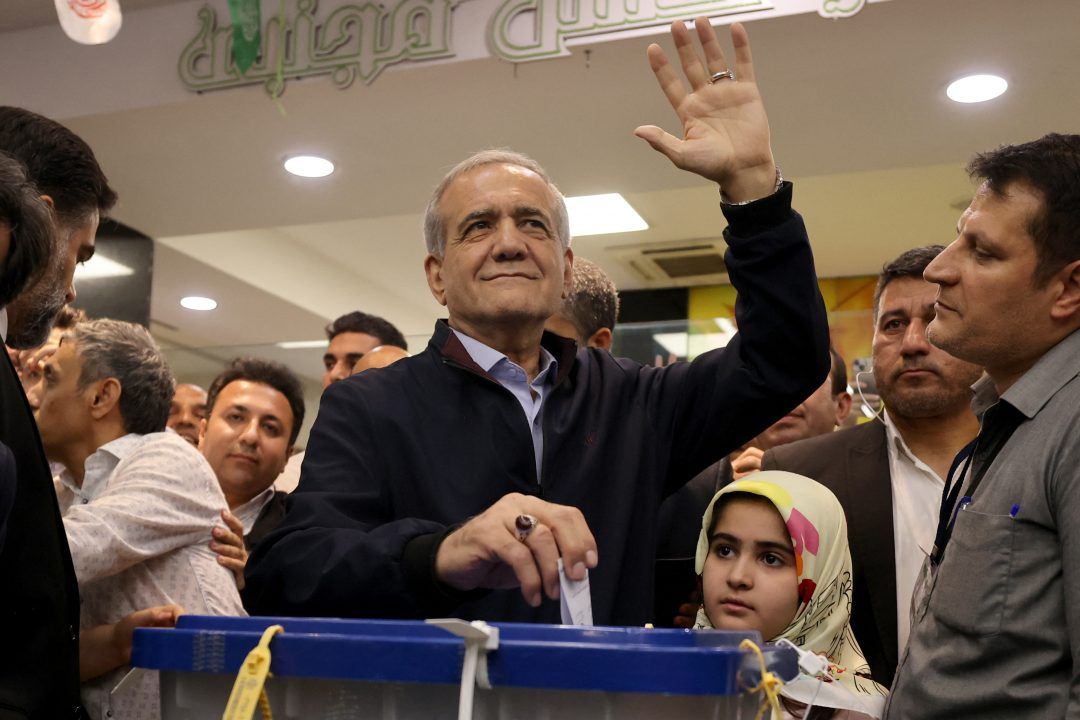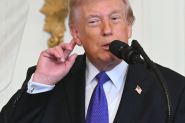- Home
- Middle East
- Masoud Pezeshkian; Iran's Lone Reformist Hopeful

©ATTA KENARE / AFP
Iranians cast their ballots Friday in a presidential election marked by a lone reformist's bid to break through against a divided conservative field.
Masoud Pezeshkian, the sole reformist candidate, hopes to break through in a divided contest characterized by its numerous ultraconservative contenders.
Born in 1954, in West Azerbaijan, he trained as a doctor, treating the wounded on the front lines during the Iran-Iraq War (1980-1988).
Widowed in 1994, when a car crash took the lives of his wife and one of his children, he raised his remaining daughter and sons alone.
Pezeshkian previously served as Minister of Health between 2001-2005, under the presidency of reformist Mohammad Khatami. He has subsequently been elected to parliament five times, becoming deputy speaker between 2016-2020.
He launched a previous presidential bid in 2021, but was blocked from contesting by the Guardian Council, which retains a veto over presidential candidates.
He speaks eloquently and likely has the vote of the Azeri regions. However, it is unclear whether he can convince enough moderate supporters to participate in the elections, following years of low turnout.
"Constructive relations" with the West
Pezeshkian is focused on improving the daily lives of Iranians, who are facing high inflation, unemployment and record currency depreciation, under the weight of the US sanctions regime.
He believes that establishing "constructive relations" with the West, will help "bring Iran out of its isolation."
According to Hamshahri, an Iranian news outlet, in a recent televised debate, Pezeshkian claimed “statistics show that whenever we reach an agreement (with the West), inflation decreases and economic growth resumes,” he added, “if we could lift the sanctions, Iranians could live comfortably.”
He has previously advocated for a nuclear agreement with the West, stating, "Are we meant to be perpetually hostile to America, or do we aspire to solve our issues with this country?"
Domestic ambiguity
A major issue in the election campaign has been Iran's mandatory hijab laws, with even the most ultraconservative candidates distancing themselves from the heavy-handed treatment of women by the police.
Pezeshkian's position on the issue has been ambiguous. During 2022's protests over the death of Mahsa Amini, he questioned the official narrative of her death, and criticized the repression against protestors. However, he went on, later, to condemn the protests as a "revolt".
He has criticized Iran's hijab laws, saying "For 40 years, we have tried to control the hijab, but we have only made the situation worse". He has promised to "end, as much as he could, the patrols of the morality police."
Yet, the hijab is mandatory at his own campaign rallies.
IRGC supporter
Pezeshkian is openly supportive of the Iranian Revolutionary Guard Corps (IRGC). He has previously worn the IRGC uniform at meetings in response to criticism that he is not supportive enough of the revolution.
In 2019 he condemned the US's declaration of the IRGC as a terrorist organization.
Masoud Pezeshkian, the sole reformist candidate, hopes to break through in a divided contest characterized by its numerous ultraconservative contenders.
Born in 1954, in West Azerbaijan, he trained as a doctor, treating the wounded on the front lines during the Iran-Iraq War (1980-1988).
Widowed in 1994, when a car crash took the lives of his wife and one of his children, he raised his remaining daughter and sons alone.
Pezeshkian previously served as Minister of Health between 2001-2005, under the presidency of reformist Mohammad Khatami. He has subsequently been elected to parliament five times, becoming deputy speaker between 2016-2020.
He launched a previous presidential bid in 2021, but was blocked from contesting by the Guardian Council, which retains a veto over presidential candidates.
He speaks eloquently and likely has the vote of the Azeri regions. However, it is unclear whether he can convince enough moderate supporters to participate in the elections, following years of low turnout.
"Constructive relations" with the West
Pezeshkian is focused on improving the daily lives of Iranians, who are facing high inflation, unemployment and record currency depreciation, under the weight of the US sanctions regime.
He believes that establishing "constructive relations" with the West, will help "bring Iran out of its isolation."
According to Hamshahri, an Iranian news outlet, in a recent televised debate, Pezeshkian claimed “statistics show that whenever we reach an agreement (with the West), inflation decreases and economic growth resumes,” he added, “if we could lift the sanctions, Iranians could live comfortably.”
He has previously advocated for a nuclear agreement with the West, stating, "Are we meant to be perpetually hostile to America, or do we aspire to solve our issues with this country?"
Domestic ambiguity
A major issue in the election campaign has been Iran's mandatory hijab laws, with even the most ultraconservative candidates distancing themselves from the heavy-handed treatment of women by the police.
Pezeshkian's position on the issue has been ambiguous. During 2022's protests over the death of Mahsa Amini, he questioned the official narrative of her death, and criticized the repression against protestors. However, he went on, later, to condemn the protests as a "revolt".
He has criticized Iran's hijab laws, saying "For 40 years, we have tried to control the hijab, but we have only made the situation worse". He has promised to "end, as much as he could, the patrols of the morality police."
Yet, the hijab is mandatory at his own campaign rallies.
IRGC supporter
Pezeshkian is openly supportive of the Iranian Revolutionary Guard Corps (IRGC). He has previously worn the IRGC uniform at meetings in response to criticism that he is not supportive enough of the revolution.
In 2019 he condemned the US's declaration of the IRGC as a terrorist organization.
Read more




Comments